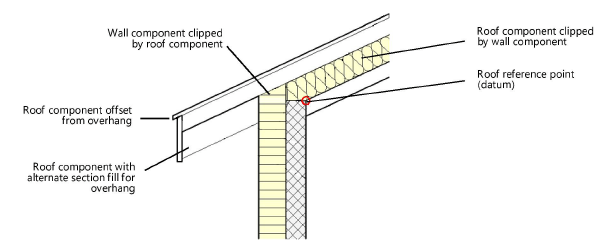 Creating roof components
Creating roof components Creating roof components
Creating roof componentsCommand |
Workspace: Path |
|
● Roof Face ● Create Roof |
● Architect: AEC ● Landmark: Landmark > Architectural ● Spotlight: Spotlight > Architectural |
Roof components define the sections that make up a roof. For example, to indicate that a roof is made up of gypsum board ceiling, wood framing, insulation, and asphalt shingles, define a component for each of these items to illustrate their location. Roof components can be offset from the edges of the walls (automatically bounded roofs) or the edge of the roof (manual roofs). Their appearance can be specified for cross-section views, especially where they intersect with walls. They can be textured, creating realistic section views and rendered views, as well as accurate roof supply estimates. If a material resource is used to define a component, the material typically provides the fill, texture, physical attributes, and construction information needed for drawings, renderings, and reports. The area and volume of roof components (minus any holes cut) can be calculated in worksheets; see Worksheet functions).

The overall thickness of a roof is equal to the sum of its components. Component fill and pen style are only displayed in section viewports.
The Auto-display detail levels for design layers preference can be used to show or hide roof components based on scale; see Hiding roof components.
Use the Eyedropper tool to copy roof component settings from one roof to another (see Transferring attributes).
To define a roof component:
1. Do one of the following:
● To define a component while a roof or roof style is being created, open the Definition tab of the Roof Preferences dialog box.
● To define or edit roof components for an existing, unstyled roof, select the roof and click Components on the Object Info palette to open the Roof Components dialog box.
For a description of the parameters in the Roof Preferences dialog box or the Roof Components dialog box, see Roof preferences.
2.Below the Components list, click New to create a new component or select a component to edit and click Edit.
The Roof Component Settings dialog box opens. Specify the component name, thickness, edge offset, and appearance in section views and rendered views.
 Click
to show/hide the parameters.
Click
to show/hide the parameters.
After you click OK, the roof’s Overall Thickness value changes to be determined by its components. As components are defined, they display in the preview. Click and drag a component in the # column to change its order. Determine which component is the datum component by clicking in the Datum column. Set the datum to the top or bottom of the component.
~~~~~~~~~~~~~~~~~~~~~~~~~